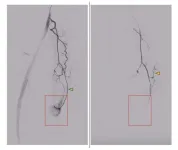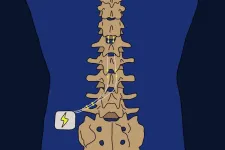(Press-News.org) CHICAGO – Skeletal muscle loss is a risk factor for developing dementia, according to a study being presented today at the annual meeting of the Radiological Society of North America (RSNA).
Skeletal muscles make up about one-third of a person’s total body mass. They are connected to the bones and allow for a wide range of movements. As people grow older, they begin to lose skeletal muscle mass.
Because age-related skeletal muscle loss is often seen in older adults with Alzheimer’s disease (AD) dementia, this study aimed to examine whether temporalis muscle loss (a measure of skeletal muscle loss) is associated with an increased risk of AD dementia in older adults.
The temporalis muscle is located in the head and is used for moving the lower jaw. Studies have shown that temporalis muscle thickness and area can be an indicator of muscle loss throughout the body.
“Measuring temporalis muscle size as a potential indicator for generalized skeletal muscle status offers an opportunity for skeletal muscle quantification without additional cost or burden in older adults who already have brain MRIs for any neurological condition, such as mild dementia,” said the study’s lead author, Kamyar Moradi, M.D., postdoctoral research fellow in the Russell H. Morgan Department of Radiology and Radiological Sciences at Johns Hopkins University School of Medicine in Baltimore. “This is the first longitudinal study to demonstrate that skeletal muscle loss may contribute to the development of dementia.”
For the multidisciplinary research study, a collaboration between the radiology and neurology departments at Johns Hopkins Medical Institutions, Dr. Moradi and colleagues used baseline brain MRI exams from the Alzheimer’s Disease Neuroimaging Initiative cohort to quantify skeletal muscle loss in 621 participants without dementia (mean age 77 years).
The researchers manually segmented the bilateral temporalis muscle on MRI images and calculated the sum cross-sectional area (CSA) of these muscles. Participants were categorized into two distinct groups: large CSA (131 participants) and small CSA (488 participants). Outcomes included subsequent AD dementia incidence, change in cognitive and functional scores, and brain volume changes between the groups. Median follow-up was 5.8 years.
Based on their analysis, a smaller temporalis CSA was associated with a higher incidence risk of AD dementia. Furthermore, a smaller temporalis CSA was associated with a greater decrease in memory composite score, functional activity questionnaire score and structural brain volumes over the follow-up period.
“We found that older adults with smaller skeletal muscles are about 60% more likely to develop dementia when adjusted for other known risk factors,” said the study’s co-senior author and professor of neurology, Marilyn Albert, Ph.D.
According to Shadpour Demehri, M.D., co-senior author and professor of radiology, the study demonstrates that this muscle change can be opportunistically analyzed through any conventional brain MRI, even when conducted for other purposes, without incurring additional costs or burdens.
Dr. Albert pointed out that early detection through readily available brain MRI could enable timely interventions to address skeletal muscle loss, such as physical activity, resistance training and nutritional support.
“These interventions may help prevent or slow down muscle loss and subsequently reduce the risk of cognitive decline and dementia,” Dr. Demehri said.
Other co-authors are Hanzhang Lu, Ph.D., Yuxin Zhu, Ph.D., Soheil Mohammadi, M.D., Sara Momtazmanesh, M.D., and Eleanor M. Simonsick, Ph.D.
###
Note: Copies of RSNA 2024 news releases and electronic images will be available online at RSNA.org/press24.
RSNA is an association of radiologists, radiation oncologists, medical physicists and related scientists promoting excellence in patient care and health care delivery through education, research and technologic innovation. The Society is based in Oak Brook, Illinois. (RSNA.org)
For patient-friendly information on brain MRI, visit RadiologyInfo.org.
END
CHICAGO – A minimally invasive procedure provides significant relief from knee pain and may prevent the need for knee replacement surgery in people with osteoarthritis, according to a study being presented this week at the annual meeting of the Radiological Society of North America (RSNA).
“This study addresses osteoarthritis, which is a significant public health issue and the leading cause of chronic pain and disability worldwide,” said the study’s lead author, Florian Nima Fleckenstein, M.D., interventional radiologist at Charité – University Hospital Berlin in Germany. “With millions of people affected by knee ...
A group of scientists, including researchers from Rutgers University-New Brunswick, Princeton University and Carleton University, has questioned the accuracy and utility of the metaphor “tipping point” in calling attention to the threat of climate change.
The phrase, while perhaps initially useful as a clarion call that warns about sudden, drastic changes, may now be confusing the public and impeding action, researchers said.
Writing a perspective in Nature Climate Change, the scientists, from the Rutgers Climate and Energy Institute, Princeton’s Center ...
Plant species can fulfil different functions within an ecosystem, even if they are closely related to each other. This surprising conclusion was reached by a global analysis of around 1.7 million datasets on plant communities. The study was led by Martin Luther University Halle-Wittenberg (MLU) and the University of Bologna. Their findings overturn previous assumptions in ecology. The study was published in "Nature Ecology & Evolution" and offers insights for nature conservation.
When ...
Specially packaged DNA secreted by tumor cells can trigger an immune response that inhibits the metastatic spread of the tumor to the liver, according to a study led by researchers at Weill Cornell Medicine, Memorial Sloan Kettering Cancer Center and Korea’s Yonsei University. The discovery improves the scientific understanding of cancer progression and anticancer immunity, and could yield new clinical tools for assessing and reducing metastasis risk.
In the study, reported Dec. 3 in Nature Cancer, the researchers examined cancer cells’ secretion of short stretches of DNA packaged on tiny capsules called extracellular ...
The first summer on record that melts practically all of the Arctic’s sea ice, an ominous milestone for the planet, could occur as early as 2027.
For the first time, an international research team, including University of Colorado Boulder climatologist Alexandra Jahn and Céline Heuzé from the University of Gothenburg in Sweden, used computer models to predict when the first ice-free day could occur in the northernmost ocean. An ice-free Arctic could significantly impact the ecosystem and Earth’s climate by changing weather patterns.
“The first ice-free day in the Arctic won’t change things dramatically,” ...
Lion numbers in the country are at a critical low while hyenas are faring well across four major protected areas in Uganda, according to new survey findings co-led by Griffith University, Southern University of Science and Technology (China) and Northern Arizona University.
Researchers unveiled the first comprehensive population estimate of Uganda’s lions, leopards, and spotted hyenas in nearly two decades.
Conducted across six major protected areas – including the 4000 km2 Murchison Falls and the 2400 km2 Queen Elizabeth Conservation Area – this innovative study was a collaborative ...
Leuven, 3 December 2024 – Alzheimer’s disease is a debilitating condition that slowly robs people of their memory and cognitive abilities, affecting millions of people worldwide. Familial Alzheimer’s disease (FAD), a rare inherited form of the disease, is linked to mutations in several genes, including APP, PSEN1, and PSEN2. The impact of PSEN2 mutations has remained less understood—until now. A research team led by Prof. Wim Annaert at VIB-KU Leuven has shed light on how mutated PSEN2 accelerates disease ...
A 10-minute brain scan can predict the effectiveness of a risky spinal surgery to alleviate intractable pain. The Kobe University result gives doctors a much-needed biomarker to discuss with patients considering spinal cord stimulation.
For patients with chronic pain that cannot be cured in any other way, a surgical procedure called “spinal cord stimulation” is seen as a method of last resort. The treatment works by implanting leads into the spine of patients and electrically stimulating the spinal cord. Because the spinal cord transmits sensations to the brain from all over the body, the position ...
The risk of developing dementia later in life is strongly predicted by a person’s cognitive ability, functional limitations and physical health as many as 20 years before onset of the illness, according to a new RAND report.
Related new research found that early detection of cognitive impairment helps people to take mitigating actions to prepare for future loss of financial and physical independence.
While older adults’ take-up of cognitive testing currently is low, additional research found that use of cognitive tests would increase if it was free and readily accessible, ...
COLUMBUS, Ohio – Some say the holidays are the most wonderful time of the year. But for others, the hectic holiday season may be the most stressful.
A new national survey of 1,000 Americans commissioned by The Ohio State University Wexner Medical Center and College of Medicine shows that 46% of Americans say they don’t get the alone time they need during the holidays.
In addition, 56% of survey respondents say that it’s very important to their mental health to have adequate alone time.
Sophie Lazarus, PhD, a clinical psychologist in the Department of Psychiatry and Behavioral Health at Ohio State, says in ...








